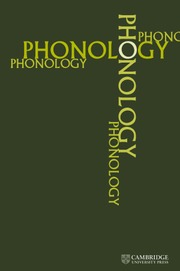Crossref Citations
This article has been cited by the following publications. This list is generated based on data provided by
Crossref.
Ringen, Catherine O.
1999.
Aspiration, Preaspiration, Deaspiration, Sonorant Devoicing and Spirantization in Icelandic.
Nordic Journal of Linguistics,
Vol. 22,
Issue. 2,
p.
137.
Krämer, Martin
2000.
Voicing alternations and underlying representations: The case of Breton.
Lingua,
Vol. 110,
Issue. 9,
p.
639.
Hale, Mark
and
Reiss, Charles
2000.
“Substance Abuse” and “Dysfunctionalism”: Current Trends in Phonology.
Linguistic Inquiry,
Vol. 31,
Issue. 1,
p.
157.
Gibson, Courtenay St. John
and
Ringen, Catherine O.
2000.
Icelandic umlaut in Optimality Theory.
Nordic Journal of Linguistics,
Vol. 23,
Issue. 1,
p.
49.
Fitzgerald, Colleen M.
2000.
Vowel Hiatus and Faithfulness In Tohono O'Odham Reduplication.
Linguistic Inquiry,
Vol. 31,
Issue. 4,
p.
713.
Dinnsen, Daniel A.
McGarrity, Laura W.
O'Connor, Kathleen M.
and
Swanson, Kimberly A. B.
2000.
On the Role of Sympathy in Acquisition.
Language Acquisition,
Vol. 8,
Issue. 4,
p.
321.
ORIE, OLANIKE OLA
2001.
An alignment-based account of vowel harmony in Ife Yoruba.
Journal of African Languages and Linguistics,
Vol. 22,
Issue. 2,
Johnson, Keith
and
Martin, Jack
2001.
Acoustic Vowel Reduction in Creek: Effects of Distinctive Length and Position in the Word.
Phonetica,
Vol. 58,
Issue. 1-2,
p.
81.
Rubach, Jerzy
2002.
Against Subsegmental Glides.
Linguistic Inquiry,
Vol. 33,
Issue. 4,
p.
672.
Beddor, Patrice Speeter
Harnsberger, James D.
and
Lindemann, Stephanie
2002.
Language-specific patterns of vowel-to-vowel coarticulation: acoustic structures and their perceptual correlates.
Journal of Phonetics,
Vol. 30,
Issue. 4,
p.
591.
Davis, Stuart
and
Cho, Mi-Hui
2003.
The distribution of aspirated stops and /h/ in American English and Korean: an alignment approach with typological implications.
Linguistics,
Vol. 41,
Issue. 4,
Casali, Roderic F.
2003.
[ATR] value asymmetries and underlying vowel inventory structure in Niger-Congo and Nilo-Saharan.
Linguistic Typology,
Vol. 7,
Issue. 3,
Goad, Heather
and
Rose, Yvan
2003.
Introduction.
Canadian Journal of Linguistics/Revue canadienne de linguistique,
Vol. 48,
Issue. 3-4,
p.
139.
Hall, T.A.
2004.
Assibilation in modern German.
Lingua,
Vol. 114,
Issue. 8,
p.
1035.
Rose, Sharon
2004.
Long-distance vowel-consonant agreement in Harari.
Journal of African Languages and Linguistics,
Vol. 25,
Issue. 1,
Elenbaas, Nine
and
Kager, René
2004.
Optimality Theory in Phonology.
p.
178.
Smith, Jennifer L.
2004.
Making constraints positional: toward a compositional model of Con.
Lingua,
Vol. 114,
Issue. 12,
p.
1433.
Beckman, Jill
2004.
Optimality Theory in Phonology.
p.
310.
Bat-El, Outi
2005.
Perspectives on Language and Language Development.
p.
25.
Klein, Thomas B.
2005.
Infixation and segmental constraint effects: UM and IN in Tagalog, Chamorro, and Toba Batak.
Lingua,
Vol. 115,
Issue. 7,
p.
959.




